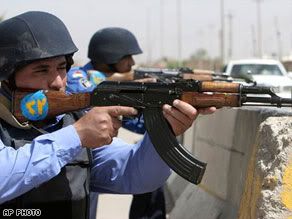Al Sadr's Cease-Fire: Already Gone?
 The last week in Iraq has been a tough one -- so tough that Gen. David Petraeus is calling for a slow-down in the troop draw-down. At the center of the deterioration is a man who's absence from the war has been the cause of a period of relative safety: Muqtada al Sadr.
The last week in Iraq has been a tough one -- so tough that Gen. David Petraeus is calling for a slow-down in the troop draw-down. At the center of the deterioration is a man who's absence from the war has been the cause of a period of relative safety: Muqtada al Sadr.Explosions rang out across central Baghdad as rockets or mortars fired from Shiite areas targeted the U.S.-protected Green Zone for the second time this week.The MSM is full to overflowing with this story today:
The violence was part of an escalation in the confrontation between the Shiite-run government and al-Sadr's followers — a move that threatens the security gains achieved by U.S. and Iraqi forces. At least 22 people were killed in the Basra fighting.
Al-Sadr's allies have grown increasingly angry over raids and detentions against them by U.S. and Iraqi forces, who insist the crackdown only affects rogue elements loyal to Iran.
Al-Sadr's headquarters in Najaf also ordered field commanders with his Mahdi Army militia to go on maximum alert and prepare "to strike the occupiers" — a term used to describe U.S. forces — and their Iraqi allies, a militia officer said. He spoke on condition of anonymity because he wasn't supposed to release the information. (AP)
- McClatchy: Is 'success' of U.S. surge in Iraq about to unravel?
- LA Times: GOP senator retracts prediction of troop cuts
- CNN: Iraqi raids anger Shiite militia
That's not to say that drum-beating isn't going on; it is. The drums in Najaf are deafening. Al Sadr and his men are seeing two things they don't like: The Iraqi government is starting to re-open the doors to allow Suni participation in the government, and suddenly there's an increasing chance a pro-war president will be elected in the U.S.
Thus, the call to prepare to "strike the occupiers" is a clear signal that the cease fire -- such as it is -- may be coming to an end. In Basra, it already has:
This is a pivotal battle for the Iraqi army. Even to hold its own against the Medhi Army will be a sign of great progress; a tip of the scales towards victory will represent very positive news.The BBC's Adam Brookes says three Iraqi army brigades were deployed from Baghdad to Basra as back-up for the offensive, and that up to 15,000 troops could be involved.
Some of the fiercest fighting in the operation - dubbed Saulat al-Fursan (Charge of the Knights) - has focused on Mehdi Army strongholds.
Of the suspected militants known to have been killed so far, four died in street fighting and five in a coalition [British] air strike.
British military spokesman Maj Tom Holloway told the BBC no UK troops were involved on the ground.
Don't count on such subtle commentary from the Dem prez candidates. They will focus only on the increase in violence, not on the causes -- which all speak to the progress of the Iraqi government and military, the effectiveness of the surge, and terrorists' fear of McCain.
For McCain, the messaging line that he alone among the candidates called the need for the surge correctly needs a tune-up. The new message -- Iraqi troops are getting better, but troop levels will have to remain higher than we'd like -- clashes against his "100 years in Iraq" mis-message, so he's got a challenge.
Labels: Iraq, McCain, Messaging, War in Iraq




<< Home